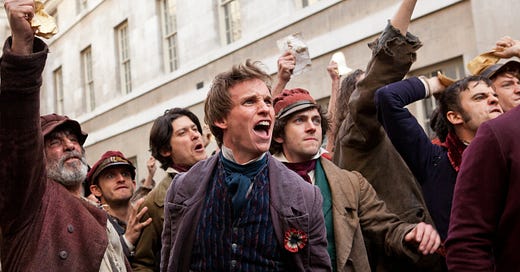100 Movies Every Catholic Should See #87: Les Misérables (2012)
Directed by Tom Hooper. Starring Hugh Jackman, Russell Crowe, and Anne Hathaway.
Today, as musical theatre fans flock to venues around the world to view the highly-anticipated first film adaptation of the hit Broadway musical Wicked, I’d like to take a moment to highlight what I believe to be perhaps the best musical theatre film in movie history: Les Misérables.
I vividly remember the night I saw Les Misérables in the theatre. While I grew up with many musical theatre classics, and did know the story of Les Misérables, somehow I had only heard a few songs from the show. When a friend and I finally made it to the theater, I recall getting popcorn beforehand, but as soon as the film started, neither of us touched it. We were completely transfixed by the story unfolding before us. It was that feeling you get when watching something so incredible that you are afraid to move, lest you spoil it. Truly, the only other film that has had that effect on me has been The Passion of the Christ. And much like the aforementioned film, Les Misérables, while being incredibly beautifully and artfully done, is not what one would consider an “easy watch.” It is quite a difficult and emotionally exhausting movie in which to partake. But I would argue that speaks all the more to the excellence of the film.
As we are talking about a movie-musical, it is only fair to put our primary focus on the singing and acting. Because it is a movie, it is important that the actors in it act well, and the entire emphasis cannot be exclusively on vocal talent. I don’t know whether anyone doubted that most cast in the movie would act their roles well. Particularly notable in their acting performances were Hugh Jackman as Jean Valjean, and Anne Hathaway as Fantine, both of whom were nominated for Academy Awards for their respective roles– Hathaway going on to win Best Supporting Actress. There is so much subtlety in Jackman’s acting– I could write a whole article just highlighting his performance. Fantine’s scene at the docks definitely hits harder watching it now, as a mother, which speaks to Hathaway’s ability to convey the desperation of a woman trying to care for her child, and her brokenness when she has found herself hopeless and ruined. I think worth noting as well, is the amount of stage actors that made a flawless transition to an onscreen role (particularly Samantha Barks and Aaron Tveit)– anyone who has acted on stage knows that while fundamentals remain the same, in practice, they are two very different crafts.
Perhaps even more surprising was just how well the actors did in fact sing! The ensemble was impeccable (particularly the young men that played the revolutionaries), and the entire cast worked together to create incredible art. To be fair, some of the actors were primarily Broadway singers prior to being in “Les Mis” (Tveit, Barks, Colm Wilkinson, and even to some extent Jackman, not to mention many of the ensemble members), but the majority of the cast made their name making Hollywood movies. To me, the only person that perhaps would have benefitted from a bit more vocal training was Russell Crowe (who has in fact participated in a band, however it is most certainly not in the musical theatre style). His voice was the only one that I found fault with– though I will emphasize, only his voice. His acting held up to the rest of the cast (particularly of note is his final scene)– and, for his vocal faux pas, I actually think he did a lovely job on both his performance and his vocals of “Stars.”
In general, while there were perhaps actors who had “fresher” voices, I think that because they were all singing within the scope of a movie all of the choices worked– and worked well– for the film. For instance, Cosette (played by Amanda Seyfried) is young, pretty, and a light for many characters. While there are many singers on Broadway who have played the part of Cosette with a strong soprano voice (even mezzo-soprano, at times– for example Judy Kuhn in the 10th Anniversary Cast), I felt that the very fragile, lyrical quality of Seyfried’s voice suited the nature of Cosette’s character perfectly. Cosette is a young woman stepping into a new world– and her voice even reflects this as she grows as a character throughout the movie, tentative and gentler at the beginning, and growing stronger towards the end. Ultimately, the rebuttal I would give to the purists who feel that the actors should have had better vocal chops is twofold: firstly, as I stated before, this is a movie musical– you have to be able to act the part, particularly in close up, tight shots in order to sell the role. Secondly, I would ask whether or not the movie would have had such an impact if it had cast actors who would be considered “no-names” in Hollywood. Part of the reason the movie drew such interest was because of the names attached.
An essential production decision that brought out the best from these actors was singing live on set. Les Mis was the first film to employ this method to the full extent that it did. All of the singing was done live, on set, as each of the actors had a hidden earpiece that played a live piano accompaniment track in their ear. Anyone who has ever performed vocally knows that the accompanist's job is to follow the vocalist– this allows the singer to set the pace, and to break and hold notes when and where appropriate. Nothing is rigid or fixed. The genuine emotion and freedom that this gives to the performances is, in my mind, the single most important reason that Les Mis is the moving piece of art that people regard it to be. Three songs in particular that I feel benefitted strongly from this method were “The Conversion,” “I Dreamed a Dream,” and “Empty Chairs at Empty Tables.” The depths of emotion that the actors are able to convey in these scenes is utterly heartbreaking, and it is all the more real because they are able to express the emotions in the moment in the song, while performing it (rather than being beholden to decisions made in a recording studio months in advance). This is no small thing. St. Augustine is attributed as saying, “to sing is to pray twice.” I think the same applies to acting. If you can express it through song, you have managed to express something in an even more profound way, as music touches us in a way nothing else can.
One of the things that helped to complement the emotion of live vocal takes, was the impeccable hair and makeup (for which Lisa Westcott and Julie Dartnell also received an Academy Award), the costuming (which was nominated for an Academy Award), and director Tom Hooper’s incredible eye for detail and nuance. The scenes that stand out to me that are just mind-blowing for their attention to detail is the opening number with Jean Valjean as a convict, and the “Lovely Ladies” scene. Valjean’s makeup and hair, down even to his teeth (which false ones were laid over to look old and in poor health) was incredible. Jackman himself put a lot of effort into looking bone tired and emaciated (including a 36 hour liquid fast), but this was enhanced by the incredible hair and makeup team. The prostitutes who sing “Lovely Ladies” at the docks have makeup and hair that perhaps once was polished, but has been abused, now rubbed and worn away, and only traces of its former splendor remain– much like the women wearing it. Other things worth noting is the makeup for the battle scene, Hooper’s touch of adding coffins to the front of the barricade, and Javert pinning his medal on the dead body of Gavroche.
This attention to detail arguably reaches an apogee in the many juxtapositions of Javert and Valjean. The opening scene, which begins with “Look Down,” contrasts Javert’s merciless attitude with the Bishop, and then Christ’s abundant gift of mercy, as it is their mercy that inspires Valjean to look up. Even when Valjean is tossing and turning at the Chapel, the image of Christ that he looks at is upside down– he doesn’t understand yet. The next time he sees an image of Christ, it is upright– after the Bishop has shown him mercy.
Since this article is about the movie rather than the original musical, I must restrain myself from an overview of the incredible and poignant score of Les Miserables. However, there are a few musical moments that I would like to highlight briefly. Firstly, and perhaps most importantly for the movie is the addition of the new, original song, “Suddenly.” In interviews, the composer, Claude Michel Schӧnberg, commented how the character transition of Valjean from a solitary mayor to a father figure changed him deeply, and needed some further explanation– this song helped to do just that. It helps to clarify many of Valjean’s motivations and decisions throughout the rest of the movie. I also want to highlight the use of leitmotif in the score, particularly when Valjean shows mercy to Javert, calling back to when the Bishop showed him mercy, and then finally Valjean’s moment of conversion is almost note for note the same as Javert’s final moment of despair. And isn’t this true? So often the moments that precede conversions or rejections are in fact the same; it is simply the direction we turn in those moments. Will we turn to mercy, or to despair?
I believe that is why the conversion scene remains one of the most powerful moments of the movie. The utter shame and devastation of our sins and what we’ve done in the face of mercy; the push and pull of the old life to a new life; the brokenness on our knees of knowing that it is still going to be a fight– still knowing we will suffer, but standing up and rejecting that old life, and rejecting who you were, to become “a new creation” as St. Paul says in 2 Corinthians 5:17: “Therefore, if anyone is in Christ, he is a new creation; the old has passed away, behold, the new has come.”
Ultimately, the reason that Les Miserables touches the hearts of so many, is because it is a story, beautifully told, of self-sacrifice, hope, and love. Self-sacrifice, knowing that there will be moments of suffering when you do what is right. Hope in a brighter, better future, particularly when that future rejects a past of sin and hate. And finally, love: the line that the Bishop and Fantine sing at the end always brings tears to my eyes. “To love another person is to see the face of God,” echoes the wisdom of many, many Saints who have gone before us, and speaks to the deepest part of our hearts. We are each made in the image and likeness of God, and our duty is to love Him, and one another. I believe that the beauty in Les Miserables can both remind us of that love, and inspire us to live out that love in our daily lives, which to me makes it an excellent piece of art indeed.
“To love our neighbor in charity, is to love God in man.” -St. Francis de Sales







Thanks for the review!
Whilst not technically a movie I would recommend the Les Miserables BBC mini-series 2018-19 starring Dominic West (Jean Valjean) and David Oyelowo (Javert). This is a faithful adaptation of Hugo's story, not a modern subversion of classic Christian literature. As a big fan of the book I was pleasantly surprised how good it was. Production and performances are excellent all around. Note - for mature audiences.
https://www.imdb.com/title/tt5900600/?ref_=tturv_ov